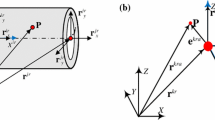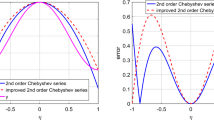Abstract
We will show how a variety of interval algorithms have found their use in the multibody modeling program MOBILE. This paper acquaints the reader with the key features of this open source software, describes how interval arithmetic help to implement new transmission elements, and reports on interval modeling of dynamics, which is an inherent part of multibody simulations. In the latter case, the interval extension of MOBILE enhanced with an interval initial value problem solver (based on VNODE) is presented. The functionality of this application is shown with some examples. We provide insights into techniques used to enhance already existing modeling software with interval arithmetic concepts.
Access this chapter
Tax calculation will be finalised at checkout
Purchases are for personal use only
Preview
Unable to display preview. Download preview PDF.
Similar content being viewed by others
References
Kecskeméthy, A.: Objektorientierte Modellierung der Dynamik von Mehrkörpersystemen mit Hilfe von "Ubertragungselementen. Fortschrittberichte VDI, Reihe 20 Nr. 88. VDI-Verlag, Düsseldorf (1993)
Kecskeméthy, A.: MOBILE Version 1.3. User’s guide (1999)
Knüppel, O.: PROFIL/BIAS—A Fast Interval Library. Computing 53, 277–287 (1994)
Dyllong, E., Luther, W., Traczinski, H.: Modelling Geometric Objects and Tolerances with Intervals: Data Exchange with ISO Standard STEP. Presented at Validated Computing 2002 (May 2002) (submitted paper)
Schiehlen, W. (ed.): Multibody Systems Handbook. Springer, Berlin (1990)
Orlandea, N.: ADAMS (Theory and applications). In: DePater, A.D., Pacejka, H.B. (eds.) Proc. 3rd Seminar on Advanced Vehicle Systems Dynamics, Amalfi, Mai 1986, pp. 121–166 (1987)
Rosenthal, D.: Order n formulation for equations of motion of multibody systems. In: SDIO/NASA Workshop on Multibody Simulations, September 3, pp. 1122–1150 (1987)
Brandl, H., Johanni, R., Otter, M.: A very efficient algorithm for the simulation of robots and similar multibody systems without inversion of the mass matrix. In: IFAC/IFIP/IMACS Symposium on Robotics, Wien (December 1986)
Featherstone, R.: Robot Dynamics Algorithms. Kluwer Academic Publishers, Boston (1987)
Kreuzer, E., Schiehlen, W.: NEWEUL — Software for the generation of symbolical equations of motion. In: Schiehlen [5], pp. 181–202
Wittenburg, J., Wolz, U.: The program MESA VERDE for robot dynamics. In: Proc. 3rd International Symposium of Robotic Research, Gonvieux (Chantilly), France (1985)
Wirfs-Brock, R., Wilkerson, B.: Object-oriented design: A responsibility-driven approach. In: OOPSLA 1989 Proceedings, October 1989, pp. 71–75 (1989)
Kecskeméthy, A.: Sparse-matrix generation of Jacobians for the object-oriented modelling of multibody dynamics. In: Pereira, M.S., Ambrósio, J.A.C. (eds.) Proceedings of the NATO-Advanced Study Institute on Computer Aided Analysis of Rigid and Flexible Mechanical Systems, Contributed Papers, Tróia, Portugal, June 27– July 9. vol. II, pp. 71–90 (1993)
American National Standards Institute / Institute of Electrical and Electronic Engineers, New York. IEEE Standard for Binary Floating-Point Arithmetic, ANSI/IEEE Std. 754-1985 (1985)
Loh, E., Walster, G.W.: Rump’s Example Revisited. Reliable Computing 8(3), 245–248 (2002)
Krämer, W.: Die Berechnung von Standardfunktionen in Rechenanlagen. In: Chatterji, S.D., Fuchssteiner, B., Kulisch, U., Liedl, R., Purkert, W. (eds.) Jahrbuch Überblicke Mathematik 1992, pp. 97–115. Vieweg, Braunschweig (1992)
Alefeld, G., Herzberger, J.: Introduction to interval computations. Academic Press, New York (1983)
Krämer, W.: A Priori Worst Case Error Bounds for Floating-Point Computations. IEEE transactions on computers 47(7), 750–756 (1998)
Luther, W., Traczinski, H.: Error propagation control in MOBILE : extended basic mathematical objects and kinetostatic transmission elements. In: Kecskeméthy, A., Schneider, M., Woernle, C. (eds.) Advances in Multibody Systems and Mechatronics, pp. 267–276. Institut für Mechanik und Getriebelehre, Technische Universität Graz, Graz (1999)
Hörsken, C., Traczinski, H.: Modeling of Multibody Systems with Interval Arithmetic. In: Krämer, W., Wolff von Gudenberg, J. (eds.) Scientific Computing, Validated Numerics, Interval Methods, pp. 317–328. Kluwer Academic Publishers, Dordrecht (2001)
Lohner, R.: Einschließung der Lösung gewönlicher Anfangs- und Randwertaufgaben und Anwendungen. PhD thesis, Universität Karlsruhe (1988)
Griewank, A.: Evaluating derivatives: principles and techniques of algorithmic differentiation. SIAM, Philadelphia (2000)
Stauning, O.: Automatic validation of numerical solutions. PhD thesis, Technical University of Denmark, Lyngby (1997)
Nedialkov, N.S.: The design and implementation of an object-oriented validated ODE solver. Kluwer Academic Publishers, Dordrecht (2002)
Lohner, R.: On the ubiquity of the wrapping effect in the computation of the error bounds. In: Kulisch, U., Lohner, R., Facius, A. (eds.) Perspectives on Enclosure Methods, pp. 201–217. Springer, New York (2001)
Bendsten, C., Stauning, O.: FADBAD, a flexible C++ package for automatic differentiation using the forward and backward methods. Technical Report 1996- x5-94, Technical University of Denmark, Lyngby (1996)
Bendsten, C., Stauning, O.: TADIFF, a flexible C++ package for automatic differentiation using Taylor series. Technical Report 1997-x5-94, Technical University of Denmark, Lyngby (1997)
Auer, E.: Ein verifizierender Anfangswertproblemlöser in C++ zur Integration in MOBILE. Master’s thesis, Gerhard Mercator Universität Duisburg (2002)
Berz, M., Makino, K.: Verified integration of ODEs and flows using differential algebraic methods on high-order Taylor models. Reliable Computing 4, 361–369 (1998)
Hammer, R., Hocks, M., Kulish, U., Ratz, D.: Basic Algorithms (Basic numerical problems). In: Numerical toolbox for verified computing, Springer, Berlin (1995)
Author information
Authors and Affiliations
Editor information
Editors and Affiliations
Rights and permissions
Copyright information
© 2004 Springer-Verlag Berlin Heidelberg
About this paper
Cite this paper
Auer, E., Kecskeméthy, A., Tändl, M., Traczinski, H. (2004). Interval Algorithms in Modeling of Multibody Systems. In: Alt, R., Frommer, A., Kearfott, R.B., Luther, W. (eds) Numerical Software with Result Verification. Lecture Notes in Computer Science, vol 2991. Springer, Berlin, Heidelberg. https://doi.org/10.1007/978-3-540-24738-8_8
Download citation
DOI: https://doi.org/10.1007/978-3-540-24738-8_8
Publisher Name: Springer, Berlin, Heidelberg
Print ISBN: 978-3-540-21260-7
Online ISBN: 978-3-540-24738-8
eBook Packages: Springer Book Archive




